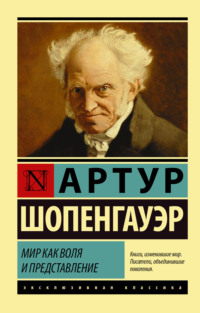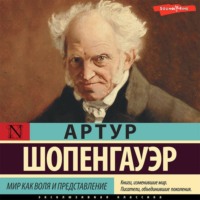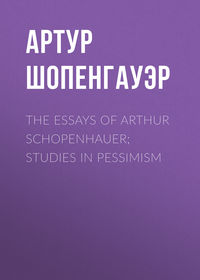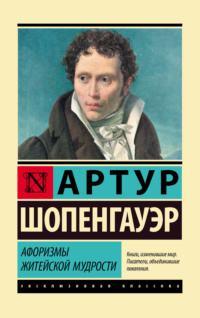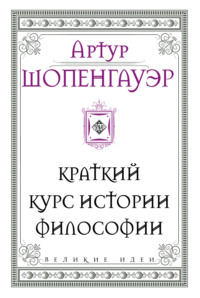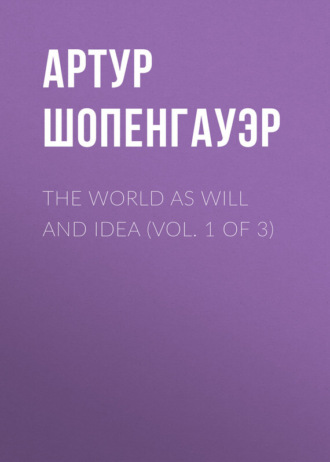 полная версия
полная версияThe World as Will and Idea (Vol. 1 of 3)
In order to bring Kant's mode of expression nearer the Platonic, we might say: Time, space, and causality are that arrangement of our intellect by virtue of which the one being of each kind which alone really is, manifests itself to us as a multiplicity of similar beings, constantly appearing and disappearing in endless succession. The apprehension of things by means of and in accordance with this arrangement is immanent knowledge; that, on the other hand, which is conscious of the true state of the case, is transcendental knowledge. The latter is obtained in abstracto through the criticism of pure reason, but in exceptional cases it may also appear intuitively. This last is an addition of my own, which I am endeavouring in this Third Book to explain.
If the doctrine of Kant had ever been properly understood and grasped, and since Kant's time that of Plato, if men had truly and earnestly reflected on the inner meaning and content of the teaching of these two great masters, instead of involving themselves in the technicalities of the one and writing parodies of the style of the other, they could not have failed to discern long ago to what an extent these two great philosophers agree, and that the true meaning, the aim of both systems, is the same. Not only would they have refrained from constantly comparing Plato to Leibnitz, on whom his spirit certainly did not rest, or indeed to a well-known gentleman who is still alive,44 as if they wanted to mock the manes of the great thinker of the past; but they would have advanced much farther in general, or rather they would not have fallen so disgracefully far behind as they have in the last forty years. They would not have let themselves be led by the nose, to-day by one vain boaster and to-morrow by another, nor would they have opened the nineteenth century, which promised so much in Germany, with the philosophical farces that were performed over the grave of Kant (as the ancients sometimes did at the funeral obsequies of their dead), and which deservedly called forth the derision of other nations, for such things least become the earnest and strait-laced German. But so small is the chosen public of true philosophers, that even students who understand are but scantily brought them by the centuries – Εισι δη ναρθηκοφοροι μεν πολλοι, βακχοι δε γε παυροι (Thyrsigeri quidem multi, Baachi vero pauci). Ἡ ατιμια φιλοσοφιᾳ δια ταυτα προσπεπτωκεν, ὁτι ου κατ αξιαν αυτης ἁπτονται; ου γαρ νοθους εδει ἁπτεσθαι, αλλα γνησιους (Eam ob rem philosophia in infamiam incidit, quad non pro dignitate ipsam attingunt: neque enim a spuriis, sad a legitimis erat attrectanda). – Plato.
Men followed the words, – such words as “a priori ideas,” “forms of perception and thought existing in consciousness independently of experience,” “fundamental conceptions of the pure understanding,” &c., &c., – and asked whether Plato's Ideas, which were also original conceptions, and besides this were supposed to be reminiscences of a perception before life of the truly real things, were in some way the same as Kant's forms of perception and thought, which lie a priori in our consciousness. On account of some slight resemblance in the expression of these two entirely different doctrines, the Kantian doctrine of the forms which limit the knowledge of the individual to the phenomenon, and the Platonic doctrine of Ideas, the knowledge of which these very forms expressly deny, these so far diametrically opposed doctrines were carefully compared, and men deliberated and disputed as to whether they were identical, found at last that they were not the same, and concluded that Plato's doctrine of Ideas and Kant's “Critique of Reason” had nothing in common. But enough of this.45
§ 32. It follows from our consideration of the subject, that, for us, Idea and thing-in-itself are not entirely one and the same, in spite of the inner agreement between Kant and Plato, and the identity of the aim they had before them, or the conception of the world which roused them and led them to philosophise. The Idea is for us rather the direct, and therefore adequate, objectivity of the thing-in-itself, which is, however, itself the will– the will as not yet objectified, not yet become idea. For the thing-in-itself must, even according to Kant, be free from all the forms connected with knowing as such; and it is merely an error on his part (as is shown in the Appendix) that he did not count among these forms, before all others, that of being object for a subject, for it is the first and most universal form of all phenomena, i. e., of all idea; he should therefore have distinctly denied objective existence to his thing-in-itself, which would have saved him from a great inconsistency that was soon discovered. The Platonic Idea, on the other hand, is necessarily object, something known, an idea, and in that respect is different from the thing-in-itself, but in that respect only. It has merely laid aside the subordinate forms of the phenomenon, all of which we include in the principle of sufficient reason, or rather it has not yet assumed them; but it has retained the first and most universal form, that of the idea in general, the form of being object for a subject. It is the forms which are subordinate to this (whose general expression is the principle of sufficient reason) that multiply the Idea in particular transitory individuals, whose number is a matter of complete indifference to the Idea. The principle of sufficient reason is thus again the form into which the Idea enters when it appears in the knowledge of the subject as individual. The particular thing that manifests itself in accordance with the principle of sufficient reason is thus only an indirect objectification of the thing-in-itself (which is the will), for between it and the thing-in-itself stands the Idea as the only direct objectivity of the will, because it has assumed none of the special forms of knowledge as such, except that of the idea in general, i. e., the form of being object for a subject. Therefore it alone is the most adequate objectivity of the will or thing-in-itself which is possible; indeed it is the whole thing-in-itself, only under the form of the idea; and here lies the ground of the great agreement between Plato and Kant, although, in strict accuracy, that of which they speak is not the same. But the particular things are no really adequate objectivity of the will, for in them it is obscured by those forms whose general expression is the principle of sufficient reason, but which are conditions of the knowledge which belongs to the individual as such. If it is allowable to draw conclusions from an impossible presupposition, we would, in fact, no longer know particular things, nor events, nor change, nor multiplicity, but would comprehend only Ideas, – only the grades of the objectification of that one will, of the thing-in-itself, in pure unclouded knowledge. Consequently our world would be a nunc stans, if it were not that, as knowing subjects, we are also individuals, i. e., our perceptions come to us through the medium of a body, from the affections of which they proceed, and which is itself only concrete willing, objectivity of the will, and thus is an object among objects, and as such comes into the knowing consciousness in the only way in which an object can, through the forms of the principle of sufficient reason, and consequently already presupposes, and therefore brings in, time, and all other forms which that principle expresses. Time is only the broken and piecemeal view which the individual being has of the Ideas, which are outside time, and consequently eternal. Therefore Plato says time is the moving picture of eternity: αιωνος εικων κινητη ὁ χρονος.46
§ 33. Since now, as individuals, we have no other knowledge than that which is subject to the principle of sufficient reason, and this form of knowledge excludes the Ideas, it is certain that if it is possible for us to raise ourselves from the knowledge of particular things to that of the Ideas, this can only happen by an alteration taking place in the subject which is analogous and corresponds to the great change of the whole nature of the object, and by virtue of which the subject, so far as it knows an Idea, is no more individual.
It will be remembered from the preceding book that knowledge in general belongs to the objectification of will at its higher grades, and sensibility, nerves, and brain, just like the other parts of the organised being, are the expression of the will at this stage of its objectivity, and therefore the idea which appears through them is also in the same way bound to the service of will as a means (μηχανη) for the attainment of its now complicated (πολυτελεστερα) aims for sustaining a being of manifold requirements. Thus originally and according to its nature, knowledge is completely subject to the will, and, like the immediate object, which, by means of the application of the law of causality, is its starting-point, all knowledge which proceeds in accordance with the principle of sufficient reason remains in a closer or more distant relation to the will. For the individual finds his body as an object among objects, to all of which it is related and connected according to the principle of sufficient reason. Thus all investigations of these relations and connections lead back to his body, and consequently to his will. Since it is the principle of sufficient reason which places the objects in this relation to the body, and, through it, to the will, the one endeavour of the knowledge which is subject to this principle will be to find out the relations in which objects are placed to each other through this principle, and thus to trace their innumerable connections in space, time, and causality. For only through these is the object interesting to the individual, i. e., related to the will. Therefore the knowledge which is subject to the will knows nothing further of objects than their relations, knows the objects only so far as they exist at this time, in this place, under these circumstances, from these causes, and with these effects – in a word, as particular things; and if all these relations were to be taken away, the objects would also have disappeared for it, because it knew nothing more about them. We must not disguise the fact that what the sciences consider in things is also in reality nothing more than this; their relations, the connections of time and space, the causes of natural changes, the resemblance of forms, the motives of actions, – thus merely relations. What distinguishes science from ordinary knowledge is merely its systematic form, the facilitating of knowledge by the comprehension of all particulars in the universal, by means of the subordination of concepts, and the completeness of knowledge which is thereby attained. All relation has itself only a relative existence; for example, all being in time is also non-being; for time is only that by means of which opposite determinations can belong to the same thing; therefore every phenomenon which is in time again is not, for what separates its beginning from its end is only time, which is essentially a fleeting, inconstant, and relative thing, here called duration. But time is the most universal form of all objects of the knowledge which is subject to the will, and the prototype of its other forms.
Knowledge now, as a rule, remains always subordinate to the service of the will, as indeed it originated for this service, and grew, so to speak, to the will, as the head to the body. In the case of the brutes this subjection of knowledge to the will can never be abolished. In the case of men it can be abolished only in exceptional cases, which we shall presently consider more closely. This distinction between man and brute is outwardly expressed by the difference of the relation of the head to the body. In the case of the lower brutes both are deformed: in all brutes the head is directed towards the earth, where the objects of its will lie; even in the higher species the head and the body are still far more one than in the case of man, whose head seems freely set upon his body, as if only carried by and not serving it. This human excellence is exhibited in the highest degree by the Apollo of Belvedere; the head of the god of the Muses, with eyes fixed on the far distance, stands so freely on his shoulders that it seems wholly delivered from the body, and no more subject to its cares.
§ 34. The transition which we have referred to as possible, but yet to be regarded as only exceptional, from the common knowledge of particular things to the knowledge of the Idea, takes place suddenly; for knowledge breaks free from the service of the will, by the subject ceasing to be merely individual, and thus becoming the pure will-less subject of knowledge, which no longer traces relations in accordance with the principle of sufficient reason, but rests in fixed contemplation of the object presented to it, out of its connection with all others, and rises into it.
A full explanation is necessary to make this clear, and the reader must suspend his surprise for a while, till he has grasped the whole thought expressed in this work, and then it will vanish of itself.
If, raised by the power of the mind, a man relinquishes the common way of looking at things, gives up tracing, under the guidance of the forms of the principle of sufficient reason, their relations to each other, the final goal of which is always a relation to his own will; if he thus ceases to consider the where, the when, the why, and the whither of things, and looks simply and solely at the what; if, further, he does not allow abstract thought, the concepts of the reason, to take possession of his consciousness, but, instead of all this, gives the whole power of his mind to perception, sinks himself entirely in this, and lets his whole consciousness be filled with the quiet contemplation of the natural object actually present, whether a landscape, a tree, a mountain, a building, or whatever it may be; inasmuch as he loses himself in this object (to use a pregnant German idiom), i. e., forgets even his individuality, his will, and only continues to exist as the pure subject, the clear mirror of the object, so that it is as if the object alone were there, without any one to perceive it, and he can no longer separate the perceiver from the perception, but both have become one, because the whole consciousness is filled and occupied with one single sensuous picture; if thus the object has to such an extent passed out of all relation to something outside it, and the subject out of all relation to the will, then that which is so known is no longer the particular thing as such; but it is the Idea, the eternal form, the immediate objectivity of the will at this grade; and, therefore, he who is sunk in this perception is no longer individual, for in such perception the individual has lost himself; but he is pure, will-less, painless, timeless subject of knowledge. This, which in itself is so remarkable (which I well know confirms the saying that originated with Thomas Paine, Du sublime au ridicule il n'y a qu'un pas), will by degrees become clearer and less surprising from what follows. It was this that was running in Spinoza's mind when he wrote: Meus æterna est, quatenus res sub æternitatis specie concipit (Eth. V. pr. 31, Schol.)47 In such contemplation the particular thing becomes at once the Idea of its species, and the perceiving individual becomes pure subject of knowledge. The individual, as such, knows only particular things; the pure subject of knowledge knows only Ideas. For the individual is the subject of knowledge in its relation to a definite particular manifestation of will, and in subjection to this. This particular manifestation of will is, as such, subordinated to the principle of sufficient reason in all its forms; therefore, all knowledge which relates itself to it also follows the principle of sufficient reason, and no other kind of knowledge is fitted to be of use to the will but this, which always consists merely of relations to the object. The knowing individual as such, and the particular things known by him, are always in some place, at some time, and are links in the chain of causes and effects. The pure subject of knowledge and his correlative, the Idea, have passed out of all these forms of the principle of sufficient reason: time, place, the individual that knows, and the individual that is known, have for them no meaning. When an individual knower has raised himself in the manner described to be pure subject of knowledge, and at the same time has raised the observed object to the Platonic Idea, the world as idea appears complete and pure, and the full objectification of the will takes place, for the Platonic Idea alone is its adequate objectivity. The Idea includes object and subject in like manner in itself, for they are its one form; but in it they are absolutely of equal importance; for as the object is here, as elsewhere, simply the idea of the subject, the subject, which passes entirely into the perceived object has thus become this object itself, for the whole consciousness is nothing but its perfectly distinct picture. Now this consciousness constitutes the whole world as idea, for one imagines the whole of the Platonic Ideas, or grades of the objectivity of will, in their series passing through it. The particular things of all time and space are nothing but Ideas multiplied through the principle of sufficient reason (the form of the knowledge of the individual as such), and thus obscured as regards their pure objectivity. When the Platonic Idea appears, in it subject and object are no longer to be distinguished, for the Platonic Idea, the adequate objectivity of will, the true world as idea, arises only when the subject and object reciprocally fill and penetrate each other completely; and in the same way the knowing and the known individuals, as things in themselves, are not to be distinguished. For if we look entirely away from the true world as idea, there remains nothing but the world as will. The will is the “in-itself” of the Platonic Idea, which fully objectifies it; it is also the “in-itself” of the particular thing and of the individual that knows it, which objectify it incompletely. As will, outside the idea and all its forms, it is one and the same in the object contemplated and in the individual, who soars aloft in this contemplation, and becomes conscious of himself as pure subject. These two are, therefore, in themselves not different, for in themselves they are will, which here knows itself; and multiplicity and difference exist only as the way in which this knowledge comes to the will, i. e., only in the phenomenon, on account of its form, the principle of sufficient reason.
Now the known thing, without me as the subject of knowledge, is just as little an object, and not mere will, blind effort, as without the object, without the idea, I am a knowing subject and not mere blind will. This will is in itself, i. e., outside the idea, one and the same with mine: only in the world as idea, whose form is always at least that of subject and object, we are separated as the known and the knowing individual. As soon as knowledge, the world as idea, is abolished, there remains nothing but mere will, blind effort. That it should receive objectivity, become idea, supposes at once both subject and object; but that this should be pure, complete, and adequate objectivity of the will, supposes the object as Platonic Idea, free from the forms of the principle of sufficient reason, and the subject as the pure subject of knowledge, free from individuality and subjection to the will.
Whoever now, has, after the manner referred to, become so absorbed and lost in the perception of nature that he only continues to exist as the pure knowing subject, becomes in this way directly conscious that, as such, he is the condition, that is, the supporter, of the world and all objective existence; for this now shows itself as dependent upon his existence. Thus he draws nature into himself, so that he sees it to be merely an accident of his own being. In this sense Byron says —
“Are not the mountains, waves, and skies, a partOf me and of my soul, as I of them?”But how shall he who feels this, regard himself as absolutely transitory, in contrast to imperishable nature? Such a man will rather be filled with the consciousness, which the Upanishad of the Veda expresses: Hæ omnes creaturæ in totum ego sum, et præter me aliud ens non est (Oupnek'hat, i. 122).48
§ 35. In order to gain a deeper insight into the nature of the world, it is absolutely necessary that we should learn to distinguish the will as thing-in-itself from its adequate objectivity, and also the different grades in which this appears more and more distinctly and fully, i. e., the Ideas themselves, from the merely phenomenal existence of these Ideas in the forms of the principle of sufficient reason, the restricted method of knowledge of the individual. We shall then agree with Plato when he attributes actual being only to the Ideas, and allows only an illusive, dream-like existence to things in space and time, the real world for the individual. Then we shall understand how one and the same Idea reveals itself in so many phenomena, and presents its nature only bit by bit to the individual, one side after another. Then we shall also distinguish the Idea itself from the way in which its manifestation appears in the observation of the individual, and recognise the former as essential and the latter as unessential. Let us consider this with the help of examples taken from the most insignificant things, and also from the greatest. When the clouds move, the figures which they form are not essential, but indifferent to them; but that as elastic vapour they are pressed together, drifted along, spread out, or torn asunder by the force of the wind: this is their nature, the essence of the forces which objectify themselves in them, the Idea; their actual forms are only for the individual observer. To the brook that flows over stones, the eddies, the waves, the foam-flakes which it forms are indifferent and unessential; but that it follows the attraction of gravity, and behaves as inelastic, perfectly mobile, formless, transparent fluid: this is its nature; this, if known through perception, is its Idea; these accidental forms are only for us so long as we know as individuals. The ice on the window-pane forms itself into crystals according to the laws of crystallisation, which reveal the essence of the force of nature that appears here, exhibit the Idea; but the trees and flowers which it traces on the pane are unessential, and are only there for us. What appears in the clouds, the brook, and the crystal is the weakest echo of that will which appears more fully in the plant, more fully still in the beast, and most fully in man. But only the essential in all these grades of its objectification constitutes the Idea; on the other hand, its unfolding or development, because broken up in the forms of the principle of sufficient reason into a multiplicity of many-sided phenomena, is unessential to the Idea, lies merely in the kind of knowledge that belongs to the individual and has reality only for this. The same thing necessarily holds good of the unfolding of that Idea which is the completest objectivity of will. Therefore, the history of the human race, the throng of events, the change of times, the multifarious forms of human life in different lands and countries, all this is only the accidental form of the manifestation of the Idea, does not belong to the Idea itself, in which alone lies the adequate objectivity of the will, but only to the phenomenon which appears in the knowledge of the individual, and is just as foreign, unessential, and indifferent to the Idea itself as the figures which they assume are to the clouds, the form of its eddies and foam-flakes to the brook, or its trees and flowers to the ice.
To him who has thoroughly grasped this, and can distinguish between the will and the Idea, and between the Idea and its manifestation, the events of the world will have significance only so far as they are the letters out of which we may read the Idea of man, but not in and for themselves. He will not believe with the vulgar that time may produce something actually new and significant; that through it, or in it, something absolutely real may attain to existence, or indeed that it itself as a whole has beginning and end, plan and development, and in some way has for its final aim the highest perfection (according to their conception) of the last generation of man, whose life is a brief thirty years. Therefore he will just as little, with Homer, people a whole Olympus with gods to guide the events of time, as, with Ossian, he will take the forms of the clouds for individual beings; for, as we have said, both have just as much meaning as regards the Idea which appears in them. In the manifold forms of human life and in the unceasing change of events, he will regard the Idea only as the abiding and essential, in which the will to live has its fullest objectivity, and which shows its different sides in the capacities, the passions, the errors and the excellences of the human race; in self-interest, hatred, love, fear, boldness, frivolity, stupidity, slyness, wit, genius, and so forth, all of which crowding together and combining in thousands of forms (individuals), continually create the history of the great and the little world, in which it is all the same whether they are set in motion by nuts or by crowns. Finally, he will find that in the world it is the same as in the dramas of Gozzi, in all of which the same persons appear, with like intention, and with a like fate; the motives and incidents are certainly different in each piece, but the spirit of the incidents is the same; the actors in one piece know nothing of the incidents of another, although they performed in it themselves; therefore, after all experience of former pieces, Pantaloon has become no more agile or generous, Tartaglia no more conscientious, Brighella no more courageous, and Columbine no more modest.




